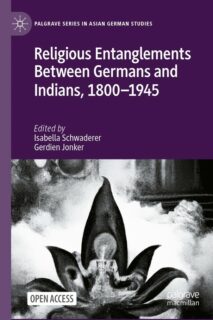Religious Entanglements Between Germans and Indians, 1800–1945
In their latest publication, Isabella Schwaderer and FAU EZIRE member Gerdien Jonker look at the religious relationship between Germany and India.
Religion as a form of cultural expression constitutes a critical element in the relationship between Germany and India. The discovery of Indian traditions in Germany and re-interpretations of those traditions in India fueled not only new theological and philosophical explorations, but also extensive innovations in the fields of music, dance, bodily experience, and political intervention. Seeking to uncover the enfolding of colonial thought structures through presentations of the Self, while placing them in the context of global colonial value chains that connected the peripheries with the centre, this interdisciplinary volume addresses India through the lens of an entangled relationship. Adopting the position that the acceleration of communication, technical development, and colonisation locally triggered re-interpretations of the religious sphere, This volume takes a look at the period from 1800 to the end of National Socialism, tracing the strands of an Indo-Germanic religion in the making as it goes along. A special emphasis is placed on the artistic expressions of religious experience including re-enactments of musical compositions and dance configurations, which were created to embody India in Germany.
The article is freely available ONLINE.
